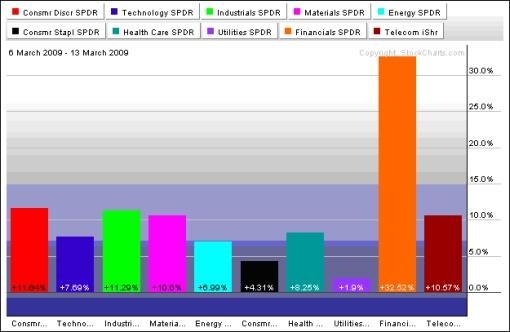Broad Gains As Yearend Rally Revives
Post on: 24 Июнь, 2015 No Comment

Mexican Market Cuts Its Losses
The stock market’s year-end rally resumed in heavy trading Wednesday, led by enthusiastic buying in the technology sector.
The Dow Jones industrial average, which fell Monday and Tuesday, ended 34.65 points higher at 3801.80 after being up more than 50 points earlier. New York Stock Exchange volume totaled 379 million shares.
Broader market indicators also gained as winning stocks outnumbered losers seven to four among NYSE-listed issues. The Nasdaq composite index rebounded 8.61 points to 737.12.
An upbeat second-quarter earnings report by software-maker Oracle, posted late Tuesday, renewed faith in the earning power of computer-related companies, despite recent marketing problems at industry giants Intel and Microsoft. Oracle gained $3, to $42.37.
The end of the year typically is bullish for stocks. A well-established pattern of rising stock prices in January, as investors put cash to work, prompts anticipatory buying in December. Hopes for a so-called Santa Claus rally in the four or five last days of the year, another seasonal pattern, fueled pre-Christmas buying.
Another factor in the year-end market is the fact that many investors who intended to dump stocks by Dec. 31 for tax purposes or portfolio house-cleaning have done so. With sellers on the sidelines, buyers can dominate.
Domino effect: The troubles in Mexico’s financial markets spilled into other Latin American countries, reminding investors of the risks of diversifying into emerging nations’ economies.
The IPC Bolsa index of Mexican stocks closed off 70.5 points, or 3.1 percent, to 2203.67. Earlier in the day the index collapsed more than 250 points.
The government Tuesday lowered the allowable floor for trading the peso against the dollar. Rumors that Mexico’s new administration would let the peso float against the dollar sent shock waves through Latin America.
The major index of stocks in Brazil, which has been one of the hottest markets this year, dropped more than 6 percent. In Argentina, the principal index fell more than 7 percent. In Chile, the main stock market index fell 1.5 percent.
Mexican officials denied any plan to let the peso float, and officials of other Latin American countries said no devaluations of their currencies were anticipated.
Leah Zell, portfolio manager for the Acorn International Fund in Chicago, said the combination of year-end factors, plus the relative illiquidity of Latin American markets in times of stress, sparked a wave of emotional selling.
Despite significant differences in the politics and economies of Latin American nations, this region tends to be connected by sympathetic nerves, she said.
Analysts said the 15 percent devaluation of the peso announced Tuesday would help Mexico meet its economic growth targets and would not necessarily contribute to inflation in the country.
We have been investors in Mexico because the country has a large population, a young population and an industrious population, Zell said. It has been moving over time in the right direction, namely toward greater democratization, toward a more open system, toward a freer market and what appears to be more responsible leadership. This is not a smooth process.
There were certain buying opportunities out there today, Zell added. If you bought at 11 o’clock this morning and sold at 3, you made money.
Treasury auction: The average yield on the Treasury’s auction of $17.3 billion of two-year notes was 7.57 percent, the highest two-year note auction yield since October 1990. The coupon rate was 7.5 percent. Individual investors bought $2.38 billion of the notes, up from $1.20 billion at the previous two-year note auction Nov. 21.
Individuals gobbled up (Wednesday’s) two-year auction with incredible zeal to get the 7.5 percent coupon, said Doug Burtnick, senior fixed-income analyst at Technical Data in Boston.
Apparently, investors believe the Federal Reserve’s recent interest rate hikes will slow the economy and enable their investment in two-year Treasuries to hold its value.
The Treasury will sell five-year notes Thursday.
Speaking of short-term interest rates, the IBC/Donoghue Money Fund Report said the average yield on taxable money-market funds reached 5.04 percent for the week ended Tuesday. That’s the first time the average has been above 5 percent since October 1991. The average started this year at 2.75 percent.
Local news: Ameritech boosted its dividend for the 11th consecutive year. The new quarterly payout-50 cents a share, up from 48 cents-will be payable Feb. 1 to shareholders of record Dec. 30. The regional telephone company also announced plans to repurchase up to 20 million shares, or 3.6 percent, of its stock.
- Andrew, an Orland Park-based supplier to the global communications industry, gained $1.25, to $51.25. The company disclosed a $12.2 million contract to provide cable for the rapid-transit system in San Francisco. Duff & Phelps Securities in Chicago named Andrew one of its favorite year-end stock selections.
- PaineWebber issued a favorable rating on ABC Rail of Chicago, with several other rail industry stocks, Reuters said. ABC Rail gained 12 cents, to $21.25.
- Goldman Sachs raised its earnings estimate for Technology Solutions, a Chicago-based computer consulting firm. The stock gained 62 cents, to $8.50.














